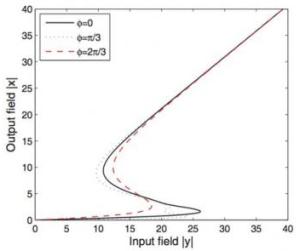Jun 20 2014
A new proposed scheme, by Wen-Xing Yang, from the Department of Physics, Southeast University, China, and colleagues, analyzed in detail the optical steady behavior in GaAs quantum well structure driven by an elliptically polarized field (EPF) in a unidirectional ring cavity.
 This image shows the input-put field intensity with difference phase ö between two components of polarized electric field of the EPF. Credit: World Scientific Publishing, 2014
This image shows the input-put field intensity with difference phase ö between two components of polarized electric field of the EPF. Credit: World Scientific Publishing, 2014
They show that the controllable optical steady behavior including multi-stability (OM) and optical bistability (OB) can be obtained via nonradiation coherence, and the frequency detuning, cooperation parameter and the amplitude of the EPF. Most interestingly, the conversion between OB and OM can be realized by adjusting the phase difference between two components of polarized electric field of the EPF. This investigation of the optical steady-state behavior of the probe field in SQW system may open up a new gate for the applications of the nonradiative coherence.
In essence, controllable optical steady behaviors including multi-stability (OM) and optical bistability (OB) are revealed for GaAs quantum wells driving by a single elliptically polarized field and a π-polarized probe field. Due to the existence of the robust nonradiative coherence, the potential to utilize the optical phase for developing the new all-optical switching devices is demonstrated.
More information on this MPLB article can be found at http://www.worldscientific.com/toc/mplb/28/15.